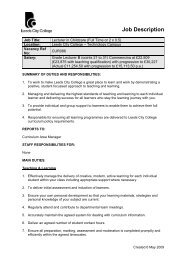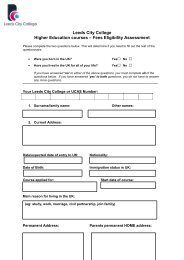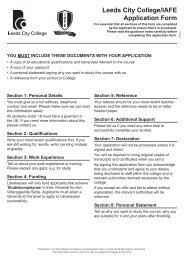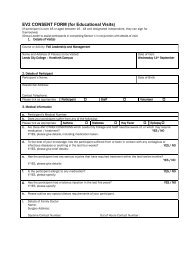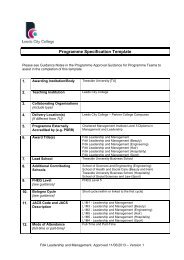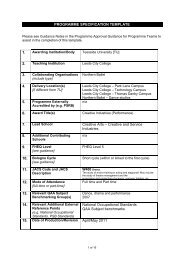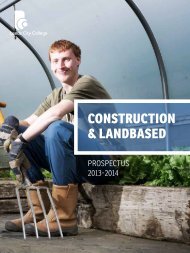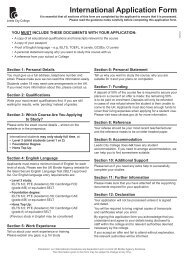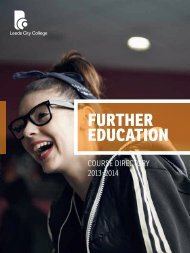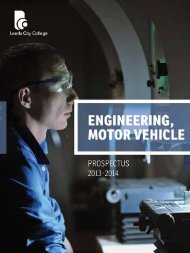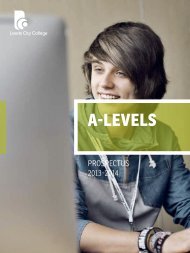Course Handbook FdA Leadership and Management 2013-14
Course Handbook FdA Leadership and Management 2013-14
Course Handbook FdA Leadership and Management 2013-14
Create successful ePaper yourself
Turn your PDF publications into a flip-book with our unique Google optimized e-Paper software.
1 Welcome to the College1.1 Welcome from the PrincipalI am delighted to have this opportunity to welcome you to Leeds City College.Thank you for choosing to study a Higher Education course with us.We have received external recognition that our HE provision is among the best in theregion, following an HE inspection, carried out by the Higher Education QualityAssurance Agency in May 2011. (The QAA inspects all Universities <strong>and</strong> colleges.) I amdelighted to report the inspection results were excellent <strong>and</strong> confirmed the very highquality of our HE programmes.We regularly seek the views of our students on the quality of their courses <strong>and</strong> use thisinformation to make improvements. Student satisfaction is consistently high, withstudents commenting on the level of support provided <strong>and</strong> the quality of feedback theyreceive on their work.At Leeds City College we know that the whole HE experience is at the heart of studentsuccess. That’s why, in addition to the actual teaching <strong>and</strong> learning experience, ourcampuses have a friendly, supportive atmosphere <strong>and</strong> we offer a wide range ofadditional personal support services which cater for all individual needs.We hope you enjoy your time with us.Peter RobertsPrincipal & Chief Executive1.2 Welcome to Leeds City CollegeWelcome to Leeds City College <strong>and</strong> the Faculty of <strong>Management</strong> <strong>and</strong>Professional Studies. In particular, welcome to the Foundation Degree in<strong>Leadership</strong> <strong>and</strong> <strong>Management</strong>.This h<strong>and</strong>book provides you with information about your <strong>Leadership</strong> <strong>and</strong><strong>Management</strong> course (which is validated by Teesside University), yourfaculty, your responsibilities as a student, support available to you, inaddition to information about assessment <strong>and</strong> other regulatory issues.Now that you have enrolled, our aim is to offer you all possible help <strong>and</strong>support to enable you to gain the qualification, prepare you to besuccessful in <strong>Leadership</strong> <strong>and</strong> <strong>Management</strong> <strong>and</strong> also for progression onto aBA (Hons) Degree top-up course if that is your choice.Page 3 of 56
The team is looking forward to meeting you <strong>and</strong> hopes that your time inLeeds is both enjoyable <strong>and</strong> successful.Best wishes to you in your future studies.Jo TyssenAward LeaderFoundation Degree <strong>Leadership</strong> <strong>and</strong> <strong>Management</strong>1.3 Which Faculty is my course in?The Foundation Degree in <strong>Leadership</strong> <strong>and</strong> <strong>Management</strong> is within theFaculty of <strong>Management</strong> <strong>and</strong> Professional Studies.The Faculty services a variety of learners 16-24 Full-time, HigherEducation, Professional Part-time <strong>and</strong> Route ways to work. The Head ofFaculty is Craig Busby, who oversees a management team which covers of4 distinct areas; <strong>Leadership</strong> <strong>and</strong> <strong>Management</strong>; Law <strong>and</strong> Legal Services;Finance <strong>and</strong> Financial Services; <strong>and</strong>, Business support Services.The aim of the faculty is to provide a comprehensive range of Education,Training <strong>and</strong> Personal Development programmes that satisfy the needs ofindividuals <strong>and</strong> organisations. This is the only faculty that can offerprogrammes of learning from foundation level to Foundation Degree <strong>and</strong>beyond to Level 7, (first level of a Masters).With Leeds being the UK’s fastest growing city, <strong>and</strong> classed as the UK’sbiggest financial <strong>and</strong> business services centre outside of London, the Facultyis focused on offering courses which encompass the needs of employers <strong>and</strong>learners <strong>and</strong> enhance the skills offered to those going on to work in industry<strong>and</strong> commerce. Some of the Professional programmes hold Centre ofExcellence status.As a Faculty within Leeds City College they provide a mix between training<strong>and</strong> education, to improve both technical knowledge <strong>and</strong> skills fororganisations in the city region, national <strong>and</strong> international arena. Theprogrammes range from traditional professional courses, to bespoke trainingbased on training needs analysis. Programmes of learning to thosebusinesses <strong>and</strong> individuals who need it are offered, <strong>and</strong> existing in-housecompany courses accredited.For students studying the Foundation Degree <strong>Leadership</strong> <strong>and</strong> <strong>Management</strong>(Hair) or Foundation Degree <strong>Leadership</strong> <strong>and</strong> <strong>Management</strong> (Beauty)pathways, your course will also have links with the Faulty of Hair <strong>and</strong>Beauty. The Faculty is based at the Printworks. The main aims of the Facultyare to provide quality education <strong>and</strong> training to meet the needs of learnersat all levels <strong>and</strong> to provide opportunities for learners to progress into HigherEducation or to enter into, <strong>and</strong> progress within industry.Page 4 of 56
For students studying on the Foundation Degree <strong>Leadership</strong> <strong>and</strong><strong>Management</strong> (Engineering) pathway, your course will also have links to theFaculty of Engineering, Manufacturing <strong>and</strong> Science. The Faculty provides arange of programmes from entry level courses through to higher education.<strong>Course</strong>s are offered in Motor Vehicle Engineering, Fabrication <strong>and</strong> Welding,Mechanical Engineering, Electrical <strong>and</strong> Electronic Engineering, <strong>and</strong>Manufacturing Engineering. The Faculty is based at the South Leeds Centrewhere the majority of courses are delivered, <strong>and</strong> at the Keighley Campus.The main aims of the Faculty are to provide quality education <strong>and</strong> training tomeet the needs of learners at all levels <strong>and</strong> to provide opportunities forlearners to progress into Higher Education or to enter into, <strong>and</strong> progresswithin industry.For students studying the Foundation Degree <strong>Leadership</strong> <strong>and</strong> <strong>Management</strong>(Hospitality), your course will also link to the Faculty of Hospitality <strong>and</strong> FoodManufacture. The Faculty is based at the Printworks.Leeds City College is one of 5 colleges in the UK to be chosen as a GoldMember of the Hospitality Guild. The college has earned this accolade for itsquality st<strong>and</strong>ards, breadth of expertise, provision <strong>and</strong> physical <strong>and</strong> staffresources. The main aims of the Faculty are to provide quality education <strong>and</strong>training to meet the needs of learners at all levels <strong>and</strong> to provideopportunities for learners to progress into Higher Education or to enter into,<strong>and</strong> progress within industry.For students studying the Foundation Degree <strong>Leadership</strong> <strong>and</strong> <strong>Management</strong>(Sport) pathway, your course will also have links to the Faculty of Sport <strong>and</strong>Public Services. The Faculty of Sport <strong>and</strong> Public Services covers a wide rangeof areas <strong>and</strong> levels including the following: Sports Development, Coaching<strong>and</strong> Fitness, Sports Performance <strong>and</strong> Excellence, Sports Science <strong>and</strong> a rangeof Sports Academies. The faculty has departments in many College sitesincluding Horsforth Campus, Keighley Campus <strong>and</strong> Park Lane Campus. Themain aim of the faculty is to plan, develop <strong>and</strong> deliver a curriculum whichmeets the needs of learners <strong>and</strong> employers in the sport <strong>and</strong> public servicessector.1.4 What facilities are available?The core elements of the course will be delivered in College House at thePark Lane Campus, in dedicated faculty teaching rooms which contain thelatest interactive teaching aids. For core modules, a dedicated teachingroom containing shuttle based laptop PCs is provided for the course whichenables interactive online activities <strong>and</strong> assessment to take place duringclass sessions. As this programme includes specialist subject modules inBeauty, Engineering, Hair, Hospitality, <strong>and</strong> Sport, specialist facilities,venues <strong>and</strong> resources within their areas are to also be utilised. Theseinclude:Hair <strong>and</strong> Beauty –Commercial salon premises, fitted to the highest specificationCreative hair studiosPage 5 of 56
Graduate SalonsMedia make-up imagery studios, including photographic roomSpecialist treatment equipmentEngineering –Engineering laboratories.A wide range of industry st<strong>and</strong>ard software applications <strong>and</strong> interactivevirtual simulation software including:MATLAB, LabVIEW, Multisim, MS Project, MPLAB, PSPICE, C+ <strong>and</strong> PLCspecificsoftware.Hospitality –On-site training kitchens <strong>and</strong> bakeries,Meat technology <strong>and</strong> food manufacturing departmentState-of-the-art international kitchenCommercial outlets – deli, bakery, butchers shopAcclaimed restaurant - FarthingsSport –Dartfish software for performance analysisSPSS software for statistical analysisWide range of practical sports equipment (multi-sport).Wide range of fitness testing equipmentAudio Visual equipment1.5 What can I do once I graduate?In addition to your Foundation Degree in <strong>Leadership</strong> <strong>and</strong> <strong>Management</strong>, youwill gain a Chartered <strong>Management</strong> Institute Level 5 Diploma in <strong>Management</strong><strong>and</strong> <strong>Leadership</strong> (a nationally recognised <strong>and</strong> highly portable businessqualification). In doing so, you will develop your generic leadership <strong>and</strong>management skills, as well as specific subject knowledge, giving you a rangeof new skills <strong>and</strong> building your self-confidence.People with Foundation Degrees will have the potential to make animmediate contribution in the workplace <strong>and</strong> early impact on 'the bottomline'.On successful completion of the Foundation Degree, students will have theopportunity to study towards a BA (Hons) Top Up Degree in Business <strong>and</strong><strong>Management</strong>. This could be at Leeds City College or any other Institutewhere you meet the entry requirements.Page 6 of 56
2 About your course2.1 Welcome to the courseThis award will have a strong vocational focus designed to equip you withthe knowledge <strong>and</strong> skills to develop your career within leadership <strong>and</strong>management, in an occupational sector of your choice. You will beintroduced to a range of concepts that underpin leadership <strong>and</strong> managementframeworks <strong>and</strong> which are essential to work at a supervisory <strong>and</strong> / ormanagement level. All assessments will be work related <strong>and</strong> contextualisedto the occupational sector. You are provided with the underpinningknowledge <strong>and</strong> expertise to progress either into the job market or tocontinue your studies at a Further or Higher Education Institution offering anappropriate top up degree.2.2 Aims of the courseThe overall aims of the Foundation Degree in <strong>Leadership</strong> <strong>and</strong> <strong>Management</strong>are to:• Develop knowledge, underst<strong>and</strong>ing <strong>and</strong> application of theories <strong>and</strong>concepts of leadership <strong>and</strong> management, as well as the legal, ethical <strong>and</strong>social responsibilities of leaders <strong>and</strong> managers.• Develop a range of leadership <strong>and</strong> management, technical, professional,<strong>and</strong> vocational skills appropriate to the occupational sector;• Develop personally <strong>and</strong> professionally within leadership <strong>and</strong>/ormanagement contexts appropriate to the occupational sector, whilstincreasing independence in learning;• Develop reflective practice skills to reflect <strong>and</strong> learn from workplaceexperiences within the occupational sector, applying relevant theory <strong>and</strong>practical projects.2.3 <strong>Course</strong> Learning OutcomesThe programme learning outcomes are:Knowledge <strong>and</strong> Underst<strong>and</strong>ingK1 Plan, undertake <strong>and</strong> evaluate a negotiated, self-managed leadership<strong>and</strong> management-related project using research methods.K2 Evaluate leadership <strong>and</strong> management theories, concepts <strong>and</strong> principlesin specific areas such as human resources, financial management,marketing <strong>and</strong> innovation & enterprise, within the chosen occupationalsectorK3 Explore <strong>and</strong> analyse the impact of the legal, ethical <strong>and</strong> socialresponsibilities of leaders, managers, <strong>and</strong> organisations, relevant inthe chosen occupational sectorPage 7 of 56
2.4 What will I learn?Level 4Level 5Programme CoreIntroduction to <strong>Leadership</strong> <strong>and</strong> <strong>Management</strong> (20 credits)Professional Development (20 credits)Sector Contexts (20 credits)Finance <strong>and</strong> Marketing for Managers (20 credits)Managing Resources (20 credits)Pathway Core(one module from sector specialism)GenericManaging Customer Relations (20 credits)BeautyPhysiology of Ageing (20 credits)EngineeringOperations <strong>Management</strong> (20 credits)HairIntroduction to Trichology(20 credits)Hospitality<strong>Management</strong> of Conferences <strong>and</strong> Events (20 credits)SportCoaching Process (20 credits)Programme CoreProject <strong>Management</strong> (20 credits)Leading People <strong>and</strong> Performance (20 credits)Work Related Learning (20 credits)Strategy, Innovation <strong>and</strong> Enterprise (20 credits)Pathway Core(two modules from sector specialism)Generic <strong>and</strong> EngineeringManaging Continuous Improvement <strong>and</strong> Change (20 credits)Learning <strong>and</strong> Development in Organisations (20 credits)BeautyAdvanced Skincare <strong>and</strong> Bodywork Techniques (20 credits)Balanced Nutrition (20 credits)HairHair Styling for Photography (20 credits)Contemporary Colouring (20 credits)HospitalityFood <strong>and</strong> Beverage <strong>Management</strong> in Hospitality (20 credits)Hospitality <strong>and</strong> Retail <strong>Management</strong> (20 credits)SportCoaching Behaviour (20 credits)Inclusive Recreation (20 credits)Foundation Degree in <strong>Leadership</strong> <strong>and</strong> <strong>Management</strong>Page 10 of 56
2.5 How will I be taught?A mixture of lectures, tutorials <strong>and</strong> seminars will be used. The lectureprogramme will impart the necessary principles <strong>and</strong> concepts. Theseminars will be a mixture of student <strong>and</strong> tutor led sessions consideringpractical examples of the principles <strong>and</strong> concepts. The tutorials will takethe form of individual support <strong>and</strong> feedback for students by tutors or otherstudents. Tutor led sessions will be held to provide an opportunity forstudents to work on examples <strong>and</strong> case studies in the areas covered bythe lectures.Student-led tutorials will consist of action learning activities, discussiongroups <strong>and</strong> report-back sessions which allow students to develop theirresearch, communication <strong>and</strong> teamwork skills.The Foundation Degree in <strong>Leadership</strong> <strong>and</strong> <strong>Management</strong> course is HigherEducation <strong>and</strong> you must make your own notes. You need to write enoughto ensure you have a good underst<strong>and</strong>ing of the subject, as a startingpoint for further reading <strong>and</strong> research <strong>and</strong> as a basis for your assignmentwork. A good set of notes, built up week by week, is the most valuablelearning resource of all. This is of particular importance when applyingcore module content to technical subject content <strong>and</strong> contextualisationthrough work based experiences.2.6 How will I be assessed?Assessment strategies used within the course include methods such aspractice-based assignments, exams, presentations, projects, portfolios,reflective reports, business cases, professional discussions, <strong>and</strong> role plays.See Appendix 3 for Assessment GridYou will have opportunities to gain recognition during your time at LeedsCity College for the extra activities you do on top of your studies, includingvolunteering, student societies, playing in College sports teams <strong>and</strong> beinga student academic representative.Page 11 of 56
3 Student Support System3.1 Who is going to teach me?Your module lecturers are the members of the College staff who you willhave most contact with. Their job is to manage <strong>and</strong> deliver their part(module) of your programme of study, assess <strong>and</strong> grade your work, <strong>and</strong> alsogive you continuous feedback on how you’re doing.Lecturers aim to develop adult, professional relationships with students. Youare encouraged to voice any concerns that you might have about your workwith the lecturer concerned.Our job is to do all we can to help you succeed but we can’t do this unlessyou talk to us about anything that is worrying you.You will be allocated a personal tutor whose job it is to deal with anyproblems that can’t be settled at lecturer level, plus more general concernsthat you might have, for example any problems you might have which maybe affecting your work.The Award Leader has overall responsibility for the running of theFoundation Degree <strong>and</strong> the well-being of the students.Vice–Principal of Faculty: Paul CoxHead of Faculty: Craig BusbyAward Leader: Jo TyssenPersonal Tutor: (TBC)Core Module Lecturers – Debbie Shore, Margo Himsworth, Sarah Morgan, ClairFitzpatrick, Karen Odgers, Michael Leach, Richard LeachElectives (technical) Module Lecturers –Debbie Shore (generic), Sarah Morgan (generic),Sarah Robinson (Beauty <strong>and</strong> Hair), Hazel Gilmartin (Beauty),John Wilson (Engineering),Suzan Reece (Hospitality),Mark Ramsden (Hair), Estelle Greenhalgh (Hair)Pav Singh (Sport), Stuart Proud (Sport), Petar Trivunovic (Sport)All module tutors contact information can be found in their respectivemodule h<strong>and</strong>books.Page 12 of 56
Award LeaderJo Tyssen - joanne.tyssen@leedscitycollege.ac.uk - 0113 386 1841Core Modules <strong>and</strong> <strong>Leadership</strong> <strong>and</strong> <strong>Management</strong> ElectivesDebbie Shore – deborah.shore@leedscitycollege.ac.uk – 0113 216 2099Michael Leach – michael.leach@leedscitycollege.ac.uk – 0113 216 2466Margo Himsworth – margo.himsworth@leedscitycollege.ac.uk –0113 216 2059Sarah Morgan – sarah.morgan@leedscitycollege.ac.uk – 0113 216 2374Clair Fitzpatrick – clair.fitzpatrick@leedscitycollege.ac.uk – 0113 216 2377Karen Odgers – karen.odgers@leedscitycollege.ac.uk – 0113 216 2279BeautySarah Robinson – sarah.robinson@leedscitycollege.ac.uk – 0113 284 6469Hazel Gilmartin – hazel.gilmartin@leedscitycollege.ac.uk – 0113 284 6460EngineeringRichard Leach – richard.leach@leedscitycollege.ac.ukJohn Wilson – john.wilson@leedscitycollege.ac.uk0113 386 1971HairSarah Robinson – sarah.robinson@leedscitycollege.ac.uk – 0113 284 6469Mark Ramsden – mark.ramsden@leedscitycollege.ac.uk – 0113 284 6253Estelle Greenhalgh – estelle.greenhalgh@leedscitycollege.ac.uk – 0113 2846460HospitalitySuzan Reece – suzan.reece@leedscitycollege.ac.uk – 0113 284 6363SportPav Singh – pav.singh@leedscitycollege.ac.ukStuart Proud – stuart.proud@leedscitycollege.ac.ukPetar Trivunovic – petar.trivunovic@leedscitycollege.ac.uk0113 216 2460The Foundation Degree in <strong>Leadership</strong> <strong>and</strong> <strong>Management</strong> <strong>Course</strong> Administratoris: Jurgita Winder – Park Lane Campus – Room A1.13Telephone number: 0113 216 2422E-mail address: jurgita.winder@leedscitycollege.ac.ukFor each module, the module leader will set out the preferred method ofcommunicating general information about that module to you, which may beby e-mail or notices posted on the course Moodle page.Page 13 of 56
3.2 What study facilities are available in the Library+The library+ centres at Leeds City College contain a range of services to helpyou with your studies:• An extensive collection of books <strong>and</strong> other publications.• Journals <strong>and</strong> e-resources.• Access to computers with printing allowances allocated toindividuals.• A very helpful team of staff who will be happy to help you gainthe maximum benefit from the services.• A dedicated member of staff for your award.• Full details of the range of facilities available at each of thecollege campuses.PLEASE NOTE : You will need to register with Library+ in order to be ableto use the facilities, including the computers. To do this you will need yourstudent ID card which you were issued with when you enrolled.How can I get help <strong>and</strong> advice?Each course has a specific Academic Librarian who has detailed knowledgeabout your chosen subject. He or she will buy all the resources for yoursubject in the library <strong>and</strong> will teach you how to make the most of theinformation available to you during your course. You will meet yourAcademic Librarian at your induction. Further help is available at the Help<strong>and</strong> Information Point in each Library.Page <strong>14</strong> of 56
4 Your responsibilities as a student4.1 What are my responsibilities?It is your responsibility as a student to comply with the scheme, course <strong>and</strong>module requirements for attendance <strong>and</strong> for completion of assessments.This includes meeting deadlines for assessments. In order to achieve thisyou should be aware of the following Core Principles:• Be Respectful – For example, ensure your interactions are alwaysrespectful <strong>and</strong> professionally conducted <strong>and</strong> College facilities areappropriately used.• Be Sensitive – For example, be aware of your language <strong>and</strong> behaviourto ensure it respects others <strong>and</strong> recognises diversity.• Be Underst<strong>and</strong>ing – For example, make sure you arrive, start <strong>and</strong>finish on time. Let the appropriate person know if you are delayed.To avoid disruption to others, late entry to a class/appointment maynot be possible.• Be There – For example, actively participate to get the most out of thetime available.• Be Prepared – For example, make sure you have done the necessarypreparatory work. If insufficient preparation has been done it may notbe possible for the planned activity to take place. Students who haveattempted but had difficulty with preparatory work should bring this tothe attention of the relevant staff member.• Be Considerate – For example, use mobile phones <strong>and</strong> electronicdevices with an awareness of how this might impact on others.(Taken from the Teesside University ‘A Guide to Promoting a MutuallyRespectful University Community’, full details of which can be found usingthe following linkhttp://www.tees.ac.uk/docs/docrepo/student%20information/A%20guide%20to%20promoting%20a%20mutually%20respectful%20university%20community.pdf )Please note that the College has a disciplinary process which can be found athttps://intranet.leedscitycollege.ac.uk/studentzone/zones/front.jsp?deptcode=196&linkid=4384.2 Where can I find out about general student regulations?These are available at:http://www.tees.ac.uk/docs/index.cfm?folder=student%20regulationsPage 15 of 56
4.3 What if I’m an international student?There are new requirements relating to immigration procedures in the UKwith the introduction of the Points-Based System. Information is availableat:http://www.leedscitycollege.ac.uk/international/index.php/visa/4.4 Are there any guidelines about attendance?The modules on the course will help you to develop both skills <strong>and</strong> academicknowledge. Most modules will require you to undertake formative work,which will help you to apply your knowledge <strong>and</strong> underst<strong>and</strong>ing, which inturn will help you to achieve a good grade in the summative assessments.Therefore it is important that you attend regularly. Research hasdemonstrated a clear link between attendance <strong>and</strong> success rates thereforewe recommend that a minimum attendance of 80% is maintained.Please note – Those students who are in receipt of a bursary willfind that their payments will be stopped if they have not met theminimum attendance requirement <strong>and</strong> are not up-to-date with theirassessed work. (please see the Bursary Factsheet on Moodle for fulldetails)The college policy is to withdraw a student from a course if they do notattend for 4 consecutive weeks. The Student Loans Company will beinformed of your withdrawal <strong>and</strong> will then stop any future payments to youraccount. Therefore, it is important that you contact the Award Leader if youare going to be absent for any length of time.During your course of study, there will be times when you are not able toattend classes because of illness, personal <strong>and</strong> domestic crises. It istherefore all the more important that you do attend when you are able tootherwise it is very easy to lose the thread of what is going on <strong>and</strong> becomedisheartened.We do not advise that you take holidays in term time. Please see thecollege calendar in Appendix 1 for details.If you are absent you must telephone or email your personal tutor to notifythem. Doctor’s notes will be required for absences of more than a couple ofdays or recurring illness. Please keep your module tutors informed if youare having difficulty attending you classes for whatever reason. We are hereto support you but cannot do that unless you keep us informed of problemsyou are experiencing.If you are absent through illness immediately prior to an examination orassignment deadline <strong>and</strong> wish to submit a case for mitigating circumstances,Page 16 of 56
you must provide us with details <strong>and</strong> any available evidence as soon aspossible.If you are absent through illness on the day of an examination orassignment deadline, you must also provide us with details <strong>and</strong> anyavailable evidence as soon as possible.Depending on the nature of your illness you may be able to apply forMitigating Circumstances. For information please follow this link:http://www.tees.ac.uk/docs/DocRepo/Student%20Regulations/Academic%20Regulations/Mitigating%20Circumstances%20Regulations.pdfYou can h<strong>and</strong> in or send medical certificates to Jo Tyssen.Notification of infectious diseaseIf you have been diagnosed with or have had contact with an infectiousdisease, you must notify us in writing within 24 hours of diagnosis. Youmust not return to College until a medical practitioner’s certificate ofclearance has been submitted.4.5 What do I do if I am going to be absent?In case of absence from College, you should contact Jo Tyssen on 0113 3861841 / 07785 556 126 or e-mail at joanne.tyssen@leedscitycollege.ac.uk4.6 How do I withdraw from my course?If you are considering withdrawal from your course you should speak to yourpersonal tutor or the Students’ Union to discuss your reasons. If there is aproblem, College or Students’ Union staff may be able to help.If you decide to withdraw from your course or programme of study, youmust notify us in writing. This notification must be sent immediately to yourAward Leader <strong>and</strong> be copied to the Registrar <strong>and</strong> Admissions Officer.4.7 Are there any specific course requirements (e.g. placements, CRBchecks)?Part-time students will be expected to be in employment whilst onprogramme, <strong>and</strong> full-time students will be expected to do a minimum of 2hours per week vocational experience within the occupational sectorthroughout the programme, or an equivalent time agreed with the coursetutor (s) (for example, a 2 week full-time placement). This provides alllearners with an opportunity to gain valuable vocational experience,networking opportunities <strong>and</strong> a chance to apply academic study in a workingenvironment.Page 17 of 56
Full-time students will require an enhanced Disclosure <strong>and</strong> Barring Service(DBS) check prior to going on any work placements agreed with thetutor(s). Where a student is already in employment, this will not benecessary.4.8 What do I do if I change my details?Whenever you change your address <strong>and</strong> contact details, particularly yourmobile phone number, you should inform your faculty immediately. This willensure we can always contact you in an emergency.The faculty will inform you of cancelled classes as soon as possible via textto the mobile phone number we have for you on our contact records. It isyour responsibility to ensure that we have your most up-to-date mobilephone number.Page 18 of 56
5 AssessmentYour work is assessed in terms of its ability to demonstrate the learningoutcomes for the module. You’ll see the exact assessment criteria in eachmodule h<strong>and</strong>book. The levels of achievement are categorised inpercentages.For each unit of study, you will complete summative assessments. Inaddition, lecturers may set “formative” assessments as part of the learningprocess. These formative assessments are important as they give you achance to obtain feedback on your performance before your summativeassignments. At the end of the unit, a mark is awarded based on theevidence of the summative assessments.5.1 How will I get my results <strong>and</strong> feedback on my work?Results from module assessments <strong>and</strong> decisions on progression to the nextlevel or awards (if you are in the final level) will be displayed on your coursenotice board. Your notice board is located outside teaching room C3.<strong>14</strong> inCollege House, opposite the Park Lane Campus building, as well as on thepathway-specific course notice board. Results will also be published on thecourse page on Moodle. You are advised to check your notice boardregularly, as they are used to display important information relating to yourcourse.You will normally receive written comments, verbal feedback or groupfeedback on your work within 3 working weeks of submission of your work.Your module leader will advise as to the format of the feedback.Feedback on your progress comes in many different forms including writtencomments about your work, verbal comments from your tutors in class or ona one-to-one basis, discussions with peers in the classroom or outside it,electronic discussion, emails, feedback grids <strong>and</strong> generic feedbackproformas. Receiving <strong>and</strong> acting on feedback is a continuous part of yourlearning experience <strong>and</strong> will help you to develop knowledge about yourstrengths <strong>and</strong> weaknesses <strong>and</strong> improve your learning <strong>and</strong> performance.Previous students have advised that it is important that you:• Are not afraid to acknowledge your successes• Reflect on the feedback you receive <strong>and</strong> think about what you havedone well <strong>and</strong> how you could improve. For example, you could keep allof your feedback together <strong>and</strong> draw up an action plan based oncommon areas of strength or concern• Try not to focus on the mark <strong>and</strong> ignore the feedback. If you havedone well, your feedback will tell you why <strong>and</strong> if you haven’t, it willsuggest ways in which you can improve• Consider the marks you are given <strong>and</strong> if you are disappointed in them,give yourself some time before going back to the feedback to look forways to improvePage 19 of 56
• Try not to take negative feedback personally. It is given to help youimprove• Are not afraid to approach tutors <strong>and</strong> lecturers for more feedback.Asking questions can be an important part of receiving feedback – <strong>and</strong>remember, your peers can be a valuable source of information too• Use feedback to self-assess your work against the assessment criteria,where possible. This can help you to address any areas you need toimprove on.5.2 Where can I find the University’s assessment regulations?Your progression from Level 4 to Level 5, achievement at Level 5, <strong>and</strong> yourgraduation <strong>and</strong> classification, are all subject to satisfying the University’sassessment <strong>and</strong> progression regulations. These regulations are available onthe University Website:http://www.tees.ac.uk/docs/index.cfm?folder=Quality%20<strong>H<strong>and</strong>book</strong>/D2-APREGS.docClick on ‘Student Regulations’ then ‘Academic Regulations’ where you willfind ‘Framework for assessment, Award <strong>and</strong> Progression Regulations’.5.3 What is the marking scheme?For each module, you will complete one or two assessments which maycontain a number of tasks. In addition, tutors will set ungraded or formativeassessments as part of the learning process. These formative assessmentsare important as they give you a chance to obtain feedback on yourperformance before your summative assessments. At the end of the modulea mark is awarded based on the evidence of the summative assessments.Please refer to Teesside University’s Assessment Regulations which can befound on the link in s5.2 above.Overall grades – Foundation DegreesIn order to determine the overall grade for your foundation degree, theaverage of the grades you achieved in the second year will be considered<strong>and</strong> applied as follows:Overall Grade Percentage BorderlineDistinction 70% - 100% 68Merit 60%-69% 58Pass 40%-59%Please note that the above tables are a guide only. For more specificinformation regarding grading of modules <strong>and</strong> awards please follow the link<strong>and</strong> instructions in s5.2Page 20 of 56
5.4 Will I have to follow a word limit?The assessment brief will contain a word limit for your work. You shouldensure that you do not submit work over the word limit as this will bepenalised.If you go beyond this limit your work will be penalised by 10% for every10% you are over the word limit.For example if an assessment requires a 1000 word report <strong>and</strong> you submit a1,200 report you will be penalised by 20% of the total possible mark.Therefore if that piece of work would have received a grade of 62%,following the application of the word count penalty, the work would onlyreceive a grade of 42%.The reason for this is that it is part of the assessment to work to the wordlimit. This develops your analytical <strong>and</strong> evaluative skills as you have to beselective as to which information you include <strong>and</strong> leave out.5.5 Assessment ReviewYour module lecturer will explain to you how the criteria have been appliedto produce your mark. If you wish to appeal the decision of an AssessmentBoard, you may do so but only under specific grounds <strong>and</strong> after your resultshave been ratified by an Assessment Board. Please note that this is not aprocedure to challenge academic judgment. If you feel you have grounds forassessment review you will need to contact the Dean of Higher Education toput forward a claim for an assessment review. Teesside University’sAssessment Regulations can be found at the link in s5.2 above.Please note : You may not appeal on the grounds of academicjudgement.5.6 How <strong>and</strong> where do I h<strong>and</strong> in an assignment?For each summative assignment a deadline for submission/presentation ofthe work will be set. Completing the work within this time period <strong>and</strong>meeting the deadline is part of the assignment.Work must be h<strong>and</strong>ed in according to the instructions given by the moduletutor, which will be detailed in the module h<strong>and</strong>book. In the majority ofcases this will be via Turnitin.Only work that is ready by the agreed deadline can hope to qualify for agood grade.Page 21 of 56
Submission deadlines <strong>and</strong> submission locations will be included within eachmodule h<strong>and</strong>book which will be h<strong>and</strong>ed out at the beginning of each moduledelivery.From time to time you may be required to submit your work throughTurnitin which is a form of plagiarism detecting software that will locatematches with previously published work. You will be given details of whichmodules this applies to <strong>and</strong> instructions as to how to do this by your moduletutors. Please note that you may only submit individual pieces of workthrough Turnitin twice.PLEASE NOTE : Computer failure will not be accepted as a reason forlate submission.Students must submit assignments in the following format.• Assignment feedback sheet• Assignment task sheet• Assignment• Bibliography5.7 Can I submit a draft?The following guidelines have been drafted to promote consistency acrossthe Higher Education provision within Leeds City College.When can I submit a Draft?The latest date for draft submissions to be submitted will be 2 weeks prior tothe h<strong>and</strong> in date for the assessment. You must remember that it could takeup to a week for the tutor to give you feedback so you may wish to submityour draft earlier than 2 weeks before the deadline so that you have moretime to incorporate the feedback into your work.How much can I submit?The draft submission should be no longer than 25% of the maximum wordsfor the assessment component e.g. for a 2000 word report a draft of up to500 words could be submitted.How many times can I submit a draft?You are allowed to submit one draft submission per assessment component.What form can the draft take?Draft submissions can consist of:Page 22 of 56
• Assessment plans – so that the tutor can give comments regardingwhether you are on the right lines.• Extracts – for comments on style.• Referencing – for the tutor to check that your referencing style iscorrect.• Reference materials to see if your reading is wide enough for theassessment.• Data tables.The above are examples of what could be submitted <strong>and</strong> is not meant to bean exhaustive list. Drafts can be submitted electronically or in hard copy.5.8 What do I do if I can’t meet a deadline for an assignment?Extensions to submission dateIf you realise that you are not going to meet the agreed deadline datebecause of illness or other exceptional circumstances, you must ask for anExtension Request form. On this, you set out your request for a shortextension. Your Award Leader may grant you an extension of up to 7 days,providing the request is made before the original deadline. It is important tonote that an extension will only be granted when it is clear that exceptionalcircumstances have prevented you from completing your work on time.NB Extensions are an exception rather than the norm.Please note that short extensions are only available for first submissions.Depending on circumstances, Long Extensions <strong>and</strong> Deferred Submissionsmay also be available – please discuss your options with your Award Leader.For details please refer to the university regulations – page 75http://www.tees.ac.uk/docs/DocRepo/Student%20Regulations/Academic%20Regulations/Mitigating%20Circumstances%20Regulations.pdfIf the circumstances are more serious <strong>and</strong> you require longer than 7 daysthen you must apply to the Mitigation panel. If mitigation is granted, yourwork will still be marked as if it was h<strong>and</strong>ed in on time. Work that is late<strong>and</strong> which is not covered by mitigation will be penalised in accordance withthe University regulations.To obtain an Extension Request Form, you need to contact Jo Tyssen, viajoanne.tyssen@leedscitycollege.ac.ukLate submissionIf you submit work after the submission date without approval, but submit itwithin seven days it will be capped at 40%. Any work submitted after 7days will not be marked.5.9 What if I have mitigating circumstances?Page 23 of 56
What follows is a brief summary of the University’s Mitigating Circumstancesprocedure <strong>and</strong> should be read in conjunction with the Regulations relating toMitigating Circumstances (Taught Components <strong>and</strong> Programmes) availableat:http://www.tees.ac.uk/docs/DocRepo/Student%20Regulations/Academic%20Regulations/Mitigating%20Circumstances%20Regulations.pdfYou are strongly recommended to read these Regulations. They provide adetailed explanation of mitigating circumstances <strong>and</strong> the proceduresexpected to be followed when you feel that your performance in asummative assessment has been affected.Mitigating circumstances are defined by the University as circumstancesoutside of the control of the student that have significantly affectedperformance in any summative assessment.The University’s intention is, wherever possible, to support you incompleting your programme of study. It recognises that there may be timeswhen you, through unforeseeable <strong>and</strong> unpreventable circumstances, findthat you are unable to perform in an examination (or other form ofassessment) to the full extent of your abilities. If you are unable to submit,or attend an examination, this procedure is also applicable to you. In suchcircumstances, the Mitigating Circumstances Regulations enable you torequest that your situation is taken into consideration. You are expected tohave taken reasonable steps to ensure that you could not have preventedthe circumstances from taking place. It is your responsibility to notify yourSchool of any mitigating circumstances which you feel will affect, or mayhave affected, your performance in any summative assessment.Remember, any application you make has to be approved by the MitigatingCircumstances Board <strong>and</strong> if it does not meet the criteria, the mitigation maynot be granted.An application for mitigation circumstances is only one of the supportmechanisms available to you, there are other options for you to consider. Itis therefore important that you discuss your situation with a tutor, who willbe able to provide guidance on the most appropriate course of action.Where you are unable to meet the deadline for an assessment, then anextension may be the better option for you. In circumstances which arelikely to affect your progress over a longer time period, you may be advisedto suspend your studies until the circumstances no longer have an impact onyour studies.The following points will help you when submitting an application formitigating circumstances.DO:Page 24 of 56
• review the grounds for applying mitigating circumstances [seeAppendix 1 of the Mitigating Circumstances Regulations]• seek guidance from your module or personal tutor if you areexperiencing difficulties in completing your work on time• meet with your tutor prior to the submission/examination date• discuss with a tutor whether an extension would be appropriate• request an extension where you are unable to meet the deadline• submit an application that covers all module assessments you aretaking during the period of difficulty• submit the application within two weeks of thesubmission/examination date• complete all sections of the form• include evidence to support your application• make sure that you have received a receipt for your application whenyou submit itDON’T:• apply for mitigating circumstances for a resubmission – mitigatingcircumstances applications are not normally granted for resubmissionopportunities• apply for mitigating circumstances if you have been granted a longextension for the same set of circumstances• apply for formative assessment (pieces of assessment that do notcount to your overall module mark)• use evidence that is undated or solely from family memberssupporting your application. You have to provide independentevidenceIf you require an Extenuating Circumstances <strong>and</strong> / or Mitigation Form, theycan be obtained from Jo Tyssen, via joanne.tyssen@leedscitycollege.ac.ukUpon completion of the form, you need to submit it to Jo Tyssen.The Award Leader will inform you of the mitigation panel’s outcome <strong>and</strong>what the arrangements are for submitting your module assessment(s).A guide to Extenuating circumstances <strong>and</strong> mitigation is available at:http://www.tees.ac.uk/docs/DocRepo/Student%20Regulations/Academic%20Regulations/Mitigating%20Circumstances%20Regulations.pdf5.10 ResubmissionIf you have submitted an in-course assessment by the defined h<strong>and</strong>-indeadline <strong>and</strong> are deemed by the Module Leader not to have passed theassessment (but it is considered that you have made a genuine attempt),you may be allowed to undertake further work on the assessment prior tothe work being formally considered by a Module Assessment Board. OnlyPage 25 of 56
one resubmission opportunity is possible for any in-course assessmentcomponent.Suitable feedback will be provided to students who are offered aresubmission <strong>and</strong> a h<strong>and</strong>-in deadline will be set for the resubmission.Key points• Always submit something for every assessment.• You must attempt all assessments at the first opportunity.• You must do each assessment (essay, project, report, portfolio etc.)for every module. You should do this even if you don’t think you canfully complete them.• You do not have an automatic right to resit or to repeat a year ofstudy.5.11 ReassessmentStudents who are unable to pass an assessment component may be granteda reassessment opportunity by a Progression <strong>and</strong> Award Board – see theTeesside University Assessment Regulations for full details:http://www.tees.ac.uk/docs/index.cfm?folder=Student%20RegulationsSelect ‘Framework for Assessment, Award <strong>and</strong> Progression Regulations’.Page 26 of 56
6 Academic <strong>and</strong> student regulations6.1 Where can I find the University’s academic regulations?Your progression from level 4 to level 5, achievement at level 5, <strong>and</strong> yourgraduation <strong>and</strong> classification, are all subject to satisfying the University’sassessment <strong>and</strong> progression regulations. These regulations are available onTeesside University’s website:http://www.tees.ac.uk/docs/index.cfm?folder=Student%20RegulationsSelect ‘Framework for Assessment, Award <strong>and</strong> Progression Regulations’.There is also a section explaining ‘Assessment Review’ Regulations <strong>and</strong>student complaints procedures. If you have any difficulty accessing orunderst<strong>and</strong>ing the information, please discuss this with one of yourlecturers.6.2 What is Academic Misconduct?What follows is only a brief summary of the University’s AcademicMisconduct procedure <strong>and</strong> should be read in conjunction with theRegulations relating to Academic Misconduct (Taught Components <strong>and</strong>Programmes) available at:http://www.tees.ac.uk/docs/index.cfm?folder=Student%20RegulationsYou are strongly recommended to read these Regulations. They provide adetailed explanation of academic misconduct, the procedures which must befollowed when an academic misconduct offence is suspected, <strong>and</strong> thepossible penalties.In order to avoid academic misconduct, the University is committed tocontinually educating its students on how to develop good academic practice<strong>and</strong> writing skills. The following support is available <strong>and</strong> it is recommendedthat you take advantage of this:• All students must submit their work through Turnitin (plagiarismdetecting software). You may only submit a piece of work throughTurnitin twice.• Briefings on academic misconduct provided at student induction events<strong>and</strong> during relevant modulesAcademic misconduct is defined by the University as any activity orattempted activity which gives an unfair advantage to one or more studentsover their peers <strong>and</strong> is treated very seriously.To ensure that students are treated fairly <strong>and</strong> equitably, academicmisconduct is divided into the following three types:Page 27 of 56
Academic Negligence: This is regarded as the least serious offence <strong>and</strong>covers first time minor offences. It includes plagiarism that is small in scale,not related to the work of other students, <strong>and</strong> which is considered to haveresulted from ignorance or carelessness.Academic Malpractice: This covers extensive paraphrasing of material withno acknowledgement of the source, systematic failure to reference,submitting work which has already been submitted for another assignment,<strong>and</strong> subsequent cases of Academic Negligence.Academic Cheating: This is regarded as the most serious offence <strong>and</strong> coversplagiarism in dissertations/final year projects/taught doctorate modules,collusion with other students, theft, commissioning/purchasing work,falsification of results/data, <strong>and</strong> all examination irregularities.If suspected of academic misconduct, you will be required to attend eitheran informal or formal meeting <strong>and</strong> if subsequently found guilty, you willreceive a penalty, the most serious of which can be exclusion from theUniversity. The processes <strong>and</strong> penalties are described in Appendix 2 of theRegulations. If you are found guilty of academic misconduct after the end ofyour course, any award that you have received may be withdrawn. This canbe done after you have graduated.The University has an Exceptional Cases Procedure which can be used whenit is suspected that a piece of work submitted by a student is not their ownwork. You could be interviewed to determine the authorship of work. Youare therefore strongly advised to retain materials used in developing work.The following tips may help you to avoid academic misconduct:DO:• familiarise yourself with the Regulations <strong>and</strong> penalties that can beincurred. For professional programmes, a single case of academicmisconduct may result in you being discontinued from your course• make sure that you know how to correctly acknowledge other people’swork or opinions <strong>and</strong> get feedback from your tutor on whether or notyou are doing this correctly• take care when making notes from books or articles. Always keep arecord of whether your notes are a paraphrase of the source or adirect quotation, so that you don’t inadvertently include quoteswithout proper acknowledgement. (This is a frequently cited reasonstudents give when accused of academic misconduct)• seek support from your module or personal tutor if you areexperiencing difficulties in completing your work on timePage 28 of 56
DON’T:• cut <strong>and</strong> paste (or reproduce) chunks of material from electronicsources or books/articles. (Even if you acknowledge the source,material not stated as being a direct quotation will make youvulnerable to an accusation of academic misconduct)• loan your work to other students. (if it is then copied, you may beaccused of academic misconduct)• borrow work from current or previous students• submit the same work for different assessments• get someone else to do your work. (Essay writing websites don’talways keep their promises <strong>and</strong> have been known to informuniversities of students who have purchased work)6.3 Are there any regulations relating to use of social media?Social media provides wonderful opportunities for life <strong>and</strong> for learning. Theterm social media describes the online tools, websites <strong>and</strong> services thatpeople use to share content, profiles, opinions, insights, experiences,perspectives <strong>and</strong> media itself. These tools include social networks, blogs,message boards, podcasts, microblogs, lifestreams, social bookmarking,wikis <strong>and</strong> blogs. The feature that all these tools, websites <strong>and</strong> services havein common is that they allow conversations <strong>and</strong> online interactions betweengroups of people. These guidelines are not intended to deter individualsfrom using these communication tools but are necessary to help protect staff<strong>and</strong> students <strong>and</strong> to prevent them damaging the college either inadvertentlyor intentionally.All students should be aware that failure to follow these guidelines couldlead to disciplinary action, <strong>and</strong> in more serious cases could be consideredgross misconduct <strong>and</strong> may lead to exclusion.Leeds City College is committed to the responsible use of social media. TheCollege may routinely monitor social media <strong>and</strong> it reserves the right toinstruct relevant parties to remove unauthorised sites. Any informationposted on social media sites must comply with the Data Protection Act.For further information <strong>and</strong> full details please refer to the Student IT <strong>and</strong>Social Networking Policy which can be found on the Student Intranet.6.4 Are there any regulations relating to research?All work related <strong>and</strong> research projects will have to be agreed by your tutorto make sure that your plans conform to the College’s Research EthicsGuidelines. These can be found on Moodle.Page 29 of 56
7 Quality ControlThe course is not subject to an external examination regime. All studentwork is continually assessed by the lecturers <strong>and</strong> is subject to internal <strong>and</strong>external moderation.A range of checks <strong>and</strong> safeguards is in place to ensure that that thequalification you receive at the end of the course continues to be acceptableto the College, HE institutions <strong>and</strong> employers.The Awarding Body is Teesside University. In order to be able to offer thisqualification, the College has to gain approval from the university, meetingstrict criteria on things like staffing, resources <strong>and</strong> quality systems.Teesside University monitors the quality of the awards through a range ofmeasures including an Annual Quality Monitoring visit at which studentrepresentatives provide their feedback on the programmes. The College isalso subject to inspections undertaken by the QAA (Quality AssuranceAgency) in order to ensure that prescribed quality st<strong>and</strong>ards are beingmaintained.Finally all of your tutors will have been observed in action by the College’sLearning Observation Team. All Leeds City College tutors have to beobserved annually.7.1 End of Year ProceduresOnce you have completed all of your assessments <strong>and</strong> these have beenmarked, moderated <strong>and</strong> seen by the External Examiner, your tutor willcompile your mark profile. These profiles will then be submitted to theModule Assessment Board.The Module Assessment Board looks at the mark profiles of each student<strong>and</strong> will make a decision as to whether you can progress onto the next levelor whether you have passed the course.NB. If you have not paid your fees in full your profile will not bepresented to the Module Assessment Board <strong>and</strong> you will not be ableto proceed into the second year or receive your award.Within a week of the Board, the Chair of the Module Assessment Board willwrite to you informing you of the decision of the Board <strong>and</strong> will give you acopy of your grade profile. If you, when you consider your grade profile,you think you might have grounds to request an Assessment Review (seethe Assessment Review Regulations for information relating to grounds) youmust initially engage in an informal discussion with the Dean of HigherPage 30 of 56
Education within 20 days of the results being published (not 10 days afterreceiving your results).Any issues that cannot be resolved through an informal discussion mayresult in the submission of an application for an Assessment Review – pleasesee the Teesside University Regulations for further information.http://www.tees.ac.uk/docs/index.cfm?folder=Student%20RegulationsSelect ‘Academic Regulations’ <strong>and</strong> then ‘Assessment Review Regulations.’A results list will also be published on your course notice board within 3working days of the Assessment Board sitting. This is the official publicisingof the results <strong>and</strong> the appeal time runs from this date. The result list willuse student numbers rather than student names so other students will notknow your results.N.B. It is your responsibility to ensure that your Award Leader hasyour correct address. The College will not be responsible for resultswhich are sent to old addresses if you have not updated your contactdetails. If you do not receive your results within the agreed time itis your responsibility to contact the Higher Education Registrar on(0113 2162563) to obtain a replacement letter.7.2 Programme specificationA programme specification is a concise description of your course’s aims<strong>and</strong> objectives <strong>and</strong> how you will be taught <strong>and</strong> assessed to achieve therequired learning outcomes. It includes information on admissions, coursestructure <strong>and</strong> the maintenance of academic st<strong>and</strong>ards. This can be foundon you course Moodle page.7.3 External ExaminersStudents often ask questions about how we know that their foundationdegree/degree is broadly of the same st<strong>and</strong>ard as those awarded forsimilar courses by other universities. In the UK we have a system calledexternal examining, which is one of several ways that we confirm thatst<strong>and</strong>ards are met. An External Examiner is generally an experiencedlecturer from another university who offers an independent view as towhether the work of students on the course is of the correct st<strong>and</strong>ard.The External Examiner does this by looking at a sample of work (e.g.assignments, exam answers, dissertations), discussing the work with yourlecturers <strong>and</strong> attending the assessment boards to endorse results. Theythen produce an annual report which tells us about any concerns theyhave <strong>and</strong> any good practice they have identified. The External Examiner’sreports are made available on Moodle.Page 31 of 56
8 Have your say8.1 Student course representativesOur College is committed to ensuring that the views of students are heard<strong>and</strong> responded to. This is partly achieved through course-level studentcourse representatives, which are recruited across all courses.Each course will elect a representative whose responsibility it will be torepresent the course group at <strong>Course</strong> Committee meetings.<strong>Course</strong> Committee meetings are an essential part of the College’s qualityassurance process <strong>and</strong> provide opportunities for both staff <strong>and</strong> students touse a range of feedback <strong>and</strong> indicators to ensure that issues affectingstudents on the course are promptly dealt with alongside s broaderdiscussion of academic matters.<strong>Course</strong> Committee meetings will take place twice per academic year, in theHigher Education Development Office (Technology Campus) – dates for your<strong>Course</strong> Committee meetings are weeks commencing:4 th November <strong>2013</strong>10 th March 20<strong>14</strong>.<strong>Course</strong> Representatives will also be invited to a Student Pathway meeting inMay. This provides an opportunity for all Leeds City College HigherEducation Student Representatives to meet with the Higher EducationManager to discuss issues <strong>and</strong> share good practice.Our College <strong>and</strong> the Students’ Union work together to raise awareness ofstudent academic representation <strong>and</strong> to provide training <strong>and</strong> developmentfor elected representatives. The Students’ Union can be contacted on 01132162215 or can be found in the Student Union Area.8.2 Module evaluationWe value your feedback. Our College undertakes module evaluations to giveyou the opportunity to tell us what you think about module delivery,assessments <strong>and</strong> the learning resources available to you. We are interestedin hearing about areas that have exceeded your expectations as well asthose that have not met your needs or requirements. There is also a freetext comments section where you can submit additional remarks <strong>and</strong>suggestions.Module evaluations are confidential <strong>and</strong> completed anonymously. Thisfeedback is used at both course <strong>and</strong> faculty level so that the studentexperience can be continuously improved. By undertaking moduleevaluations you can help us to refresh <strong>and</strong> revise our module delivery toPage 33 of 56
enhance the learning experience <strong>and</strong> continue to improve upon ouracademic provision.8.3 Your feedbackThere are many ways that you can tell us about your experience here at ourCollege. The Students’ Union runs regular meetings where you can comealong, meet students from other courses, <strong>and</strong> discuss your concerns withmembers of staff from across all faculties <strong>and</strong> services.The faculty will also organise a <strong>Course</strong> Committee meeting to cover yourcourse <strong>and</strong> level twice yearly, where you can give feedback on yourexperience of the course to a range of academic staff. Any issues noted atthese groups will be fed into the formal monitoring <strong>and</strong> review process.If you are entering into your final year you may also be invited to participatein the National Student Survey. This is a survey for all final year students inall universities in Engl<strong>and</strong> <strong>and</strong> the results are made public to helpprospective students make choices about where <strong>and</strong> what to study. Againthese results are used by staff on your course to make improvements <strong>and</strong> toshare good practice. Your feedback matters – so take these opportunities toget involved.8.4 What happens with my feedback?We take your comments very seriously <strong>and</strong> you can find out what actionshave been taken in response to your feedback through your <strong>Course</strong>Representative, the Students’ Union, your tutors or your course Moodlepage. The faculty also provides updates on action taken through the “Yousaid, We did” posters prominently displayed around our College.8.5 How would I make a complaint?We always hope that your experience of the college <strong>and</strong> your course will bea positive one, however at times things do go wrong. If you have cause forcomplaint we would encourage you to talk to your CAM in the first instance,however if you wish to make a formal complaint you will find informationusing the following link:Compliments/ComplaintsPage 34 of 56
9 Where to get help9.1 ‘Here to Help’ AreasThe Here to Help areas are staffed information points which can be found atall Leeds City College campus’. We are here to make sure that your time atLeeds City College is as trouble free as possible. If you have a question orwant information <strong>and</strong> advice about life at Leeds City College, then the ‘Hereto Help’ areas are the place to ask. If we cannot help you immediately, wewill let you know who can help you, <strong>and</strong> in many cases, book anappointment for you if required.The Student Counselling Service is able to offer confidential advice <strong>and</strong> helpif you have any personal or financial problems that are threatening yourcollege work. Please do not hesitate to use it if <strong>and</strong> when the need arises.The College provides a good support system but can only help if you use it.If you do have problems contact either your tutor or a member of theCounselling staff at counselling@leedscitycollege.ac.ukOther Useful contacts are:careers1@leedscitycollege.ac.ukwelfare@leedscitycollege.ac.ukFull details of the services available can be found on Moodle.9.2 Students’ Union adviceIf you need independent advice, information or representation, the Students’Union Advice Service provides a free, confidential <strong>and</strong> non-judgementaladvice service.The service is staffed by professionals, who are specialists in providinginformation <strong>and</strong> advice on all regulations, policies <strong>and</strong> procedures, includingacademic appeals, student complaints, disciplinary hearings, cheating <strong>and</strong>plagiarism.9.3 Safety, health <strong>and</strong> well-beingFire safety proceduresThe following advice is taken from the Leeds Metropolitan University FireRegulations <strong>and</strong> Procedures:Fire prevention is everyone’s responsibility. You can help to preventfires by:• Good housekeepingPage 35 of 56
• Safe use of electrical <strong>and</strong> gas appliances• Observing our University no-smoking policyFire informationFire information is present on Fire Action Notices displayed in all Collegebuildings. These are normally present in corridors or inside classrooms.They inform you of the appropriate action to take, the location of thenearest Fire Alarm Call Point, the location of fire fighting equipment <strong>and</strong> thelocation of fire assembly points.All fire exit routes are clearly identified. You should take the opportunity tofamiliarise yourself with the location of fire exit routes <strong>and</strong> fire assemblypoints for the buildings that you may use in the course of your studies.If you discover a fireIf you discover a fire, you should sound the alarm by operating the FireAlarm Call Point. You should report the circumstances <strong>and</strong> site of fire bycalling 999 – indicated on the Fire Action Notice.Do not tackle the fire unless you have been trained to do so. Evacuate thebuilding to the fire assembly point indicated on the Fire Action Notice. Do notre-enter the building until officially authorised to do so.Fire evacuationOn hearing the Fire Alarm, everyone should proceed calmly to the nearestavailable safe fire exit, as indicated by the green <strong>and</strong> white fire exit signage.Please assist visitors.Follow the route to get out of the building <strong>and</strong> continue on to the fireassembly point so as not to impede the remaining evacuees exiting thebuilding.Take appropriate action to assist mobility impaired persons or wheelchairusers to a safe refuge.• Do not stop to collect belongings <strong>and</strong> do not try to leave by yourusual entry route unless this is the way indicated by the escapesigns.• Do not attempt to use the lifts.• Do not restrict emergency service access routes.• Do not re-enter building until officially authorised to do soEvacuation is practised through fire drills. However, you should regard anycontinuous sounding of the alarm as a fire incident <strong>and</strong> act accordingly.Page 36 of 56
Disabled studentsYou are expected to declare any disability that would affect your safety inthe event of a fire, e.g. hearing impairment or the use of a wheelchair.If you are referred to the Disability Adviser, a Personal EmergencyEvacuation Plan (PEEP) will be developed for you, as appropriate.First AidFirst Aid Notices (green <strong>and</strong> white) are displayed in all College buildingsalongside the Fire Action Notices (predominantly blue <strong>and</strong> white) <strong>and</strong>alongside, or adjacent to, each First Aid box. Each first Aid Notice gives thefollowing information:• The location <strong>and</strong> contact number of the nearest First Aiders(s)• The location of the nearest First Aid box• The College emergency telephone number 3333 (Park Lanecampus – for other campus’ please check• Other emergency contact numbersThe names <strong>and</strong> telephone numbers of the nearest First Aiders can also beobtained from the Health <strong>and</strong> Safety team on 2166334.Accident <strong>and</strong> incident reportingAll accidents, incidents <strong>and</strong> dangerous occurrences must be reported to, <strong>and</strong>recorded by College staff.Accident report forms (HS1) are available on the intranet.Policy statementLeeds City College Corporation accepts both moral <strong>and</strong> legal responsibility asan employer to ensure; so far as is reasonably practicable, the safety, health<strong>and</strong> welfare at work of all its employees. The College will ensure to conductits undertakings in such a way that persons not in direct college employment(i.e. students, contractors <strong>and</strong> members of the general public) who may beaffected, are not exposed to risks to their safety <strong>and</strong> health. In addition theCollege will actively endeavour to limit the adverse affects on theenvironment in which operations are carried out.All safety, health <strong>and</strong> welfare matters will be treated as a managementresponsibility equal to that of any other managerial function.Leeds City College Corporation is committed to continuous improvement inhealth <strong>and</strong> safety performance <strong>and</strong> to attaining the highest possible practicest<strong>and</strong>ards throughout the college.Page 37 of 56
Appendix 1COLLEGE HE CALENDAR <strong>2013</strong> / 20<strong>14</strong>CollegeWeekCommencesMonday50 8 July <strong>2013</strong>51 15 July <strong>2013</strong>52 22 July <strong>2013</strong>NoteProgrammeWeek1 29 July <strong>2013</strong>2 5 August <strong>2013</strong>3 12 August <strong>2013</strong>4 19 August <strong>2013</strong>5 26 August <strong>2013</strong>6 2 September <strong>2013</strong>(College Closed Monday 26 th August <strong>2013</strong> -Summer Bank Holiday)7 9 September <strong>2013</strong> HE Enrolment <strong>and</strong> Induction8 16 September <strong>2013</strong> Semester One Commences 19 23 September <strong>2013</strong> 210 30 September <strong>2013</strong> 311 7 October <strong>2013</strong> 412 <strong>14</strong> October <strong>2013</strong> 513 21 October <strong>2013</strong>College Closed to Students Friday 25 th October<strong>2013</strong> (Staff Development Day)6<strong>14</strong> 28 October <strong>2013</strong> Autumn Half Term15 4 November <strong>2013</strong> 716 11 November <strong>2013</strong> 817 18 November <strong>2013</strong> 918 25 November <strong>2013</strong> 1019 2 December <strong>2013</strong> 1120 9 December <strong>2013</strong> 1221 16 December <strong>2013</strong>Christmas Holidays for students from Friday20th December <strong>2013</strong>1322 23 December <strong>2013</strong> Christmas Holiday for Students (Monday 6 th23 30 December <strong>2013</strong>January 20<strong>14</strong> Staff Development Day)24 6 January 20<strong>14</strong>Students Return after Christmas Holiday -Tuesday 7 th January 20<strong>14</strong><strong>14</strong>25 13 January 20<strong>14</strong> Semester One Ends 1526 20 January 20<strong>14</strong> Semester Two Commences 1627 27 January 20<strong>14</strong> 1728 3 February 20<strong>14</strong> 1829 10 February 20<strong>14</strong> Mitigation Panel 1930 17 February 20<strong>14</strong> Spring Half Term31 24 February 20<strong>14</strong> Module Boards 2032 3 March 20<strong>14</strong> 2133 10 March 20<strong>14</strong> 2234 17 March 20<strong>14</strong> 2335 24 March 20<strong>14</strong> 2436 31 March 20<strong>14</strong> 2537 7 April 20<strong>14</strong> Easter Holiday for Students 9 th April to 22 ndApril 20<strong>14</strong> (College closed Friday 11 th April 20<strong>14</strong>38 <strong>14</strong> April 20<strong>14</strong> – Good Friday <strong>and</strong> Monday <strong>14</strong> th April – EasterMonday)Page 38 of 56
CollegeWeekCommencesMondayNoteProgrammeWeek39 21 April 20<strong>14</strong> 2640 28 April 20<strong>14</strong> 2741 5 May 20<strong>14</strong>(College Closed - Monday 5 th May - May DayBank Holiday)2842 12 May 20<strong>14</strong> 2943 19 May 20<strong>14</strong> Semester Two Ends 3044 26 May 20<strong>14</strong>Summer Half Term (College Closed - Monday26 th May 20<strong>14</strong> - Spring Bank Holiday)45 2 June 20<strong>14</strong> Mitigation Panel 3<strong>14</strong>6 9 June 20<strong>14</strong> 3247 16 June 20<strong>14</strong> 3348 23 June 20<strong>14</strong> Progression <strong>and</strong> Award Boards 3449 30 June 20<strong>14</strong>Admin Week & Staff Development for All Staff(College Closed to Students)COLLEGE CLOSURE DATES: PUBLIC HOLIDAYSMonday 26 th August <strong>2013</strong> (Bank Holiday)Wednesday 25 th December <strong>2013</strong> (Christmas Day)Thursday 26 th December <strong>2013</strong> (Boxing Day)Friday 27 th December <strong>2013</strong> – Tuesday 31 st December <strong>2013</strong> (College ClosureDays)Wednesday 1 st January 20<strong>14</strong> (New Year’s Day)Friday 11 th April 20<strong>14</strong> (Good Friday)Monday <strong>14</strong> th April 20<strong>14</strong> (Easter Monday)Monday 5 th May 20<strong>14</strong> (May Day Bank Holiday)Monday 26 th May 20<strong>14</strong> (Spring Bank Holiday)College sites may close for additional days. This will be confirmed atenrolment.NOTES:• The College main sites will be closed for the days stated above <strong>and</strong> alsoto students on the Staff Development Days.• Some full-time programmes may have additional holiday/study weeks ormay vary from the 2 semester calendar. Students will be informed ofthese dates at the start of their programme.• Students may take additional leave for festival days associated with theirpractised religion. Tutors must be notified in advance.Page 39 of 56
Appendix 2PROGRAMME LEARNING OUTCOME GRIDOutcome KeyModule Name Level 4 K1 K2 K3 C1 C2 P1 P2 T1 T2 T3 T4 T5Introduction to <strong>Leadership</strong> <strong>and</strong>A A A A A<strong>Management</strong>Sector Contexts A A A A AManaging Resources A A A A A AProfessional Development A A A A A A A AFinance <strong>and</strong> Marketing forA A A A A AManagersManaging Customer RelationsA A A A A A(generic pathway)Physiology of Ageing (BeautyA A A A A A Apathway)Operations <strong>Management</strong>A A A A A A A A A(Engineering pathway)Introduction to Trichology (HairA A A A A Apathway)<strong>Management</strong> of Conferences <strong>and</strong>A A A A A A A AEvents (Hospitality pathway)Coaching Process (Sport pathway) A A A A A A A A
Module Name Level 5 K1 K2 K3 C1 C2 P1 P2 T1 T2 T3 T4 T5Project <strong>Management</strong> A A A A A A A A ALeading People <strong>and</strong> Performance A A A A A AWork Related Learning A A A A A A A A A A AStrategy, Innovation <strong>and</strong>EnterpriseManaging ContinuousImprovement <strong>and</strong> Change (generic<strong>and</strong> Engineering pathway)Learning <strong>and</strong> Development inOrganisations (generic <strong>and</strong>Engineering pathway)Advanced Skincare <strong>and</strong> BodyworkTechniques (Beauty pathway)Balanced Nutrition (Beautypathway)Hair Styling for Photography (Hairpathway)Contemporary Colouring (Hairpathway)Food <strong>and</strong> Beverage <strong>Management</strong>in Hospitality (Hospitalitypathway)Hospitality <strong>and</strong> Retail<strong>Management</strong> (Hospitalitypathway)Coaching Behviour (Sportpathway)Inclusive Recreation (Sportpathway)A A A A A AA A A A A AA A A A AA A A A A A A AA A A A AA A A A A A A A A AA A A A A A AA A A A A A AA A A A A A AA A A A A A A A AA A A A A A A A A APage 41 of 56
Pathway 1(<strong>Leadership</strong> <strong>and</strong><strong>Management</strong>)PATHWAY SPECIFIC LEARNING OUTCOME GRIDPathway 2 (Beauty) Pathway 3(Engineering)Pathway 4 (Hair) Pathway 5(Hospitality)Pathway 6 (Sport)Module Name Level 4 S1 S2 S1 S2 S1 S2 S1 S2 S1 S2 S1 S2Managing Customer ARelations (genericpathway)Physiology of AgeingA(Beauty pathway)Operations<strong>Management</strong>(Engineering pathway)Introduction toTrichology (Hairpathway)<strong>Management</strong> ofConferences <strong>and</strong> Events(Hospitality pathway)Coaching Process (Sportpathway)AAAAAAPage 42 of 56
Pathway 1(<strong>Leadership</strong> <strong>and</strong><strong>Management</strong>)Pathway 2 (Beauty) Pathway 3(Engineering)Pathway 4 (Hair) Pathway 5(Hospitality)Pathway 6 (Sport)Module Name Level 5 S1 S2 S1 S2 S1 S2 S1 S2 S1 S2 S1 S2Managing Continuous A A A AImprovement <strong>and</strong>Change (generic <strong>and</strong>Engineering pathway)Learning <strong>and</strong>A A A ADevelopment inOrganisations (generic<strong>and</strong> Engineeringpathway)Advanced Skincare <strong>and</strong>ABodywork Techniques(Beauty pathway)Balanced NutritionA(Beauty pathway)Hair Styling forAPhotography (Hairpathway)ContemporaryAColouring (Hairpathway)Food <strong>and</strong> BeverageA<strong>Management</strong> inHospitality (Hospitalitypathway)Hospitality <strong>and</strong> RetailA<strong>Management</strong>(Hospitality pathway)Coaching BehaviourAA(Sport pathway)Inclusive Recreation(Sport pathway)APage 43 of 56
Appendix 3Level 4 Year : 1ASSESSMENT GRIDReportDevelopmentplanPractical <strong>and</strong>ReflectionRole Play<strong>Management</strong>PlanCase studyProfessionalDiscussionPortfolioPresentationExamIntroduction to<strong>Leadership</strong> <strong>and</strong><strong>Management</strong>ManagingResources60% 40%40% 60%Sector Contexts 70% 30%Professional50% 50%DevelopmentFinance <strong>and</strong>Marketing forManagersManaging CustomerRelations (genericpathway)Physiology ofAgeing (Beautypathway)Operations<strong>Management</strong>(Engineeringpathway)Introduction toTrichology (Hairpathway)<strong>Management</strong> ofConferences <strong>and</strong>50% 50%50% 50%100%30% 70%60% 40%50% 50%Page 44 of 56
Events (Hospitalitypathway)Coaching Process(Sport pathway)50% 50%Level 5 Year : 2ReportBusiness CaseWRL projectRole PlayPractical <strong>and</strong>ReflectionPlanPortfolioProject ReviewBusiness GameEvaluationProfessionalDiscussionCase StudyPresentationExamProject<strong>Management</strong>Leading People <strong>and</strong>PerformanceStrategy,Innovation <strong>and</strong>EnterpriseWork RelatedLearningManagingContinuousImprovement <strong>and</strong>Change (generic<strong>and</strong> Engineeringpathways)Learning <strong>and</strong>Development inOrganisations(generic <strong>and</strong>Engineeringpathways)Advanced Skincare<strong>and</strong> Bodywork50% 50%60% 40%50% 50%50% 50%40% 60%70% 30%50% 50%Page 45 of 56
Techniques (Beautypathway)Balanced Nutrition(Beauty pathway)Hair Styling forPhotography (Hairpathway)ContemporaryColouring (Hairpathway)Food <strong>and</strong> Beverage<strong>Management</strong> inHospitality(Hospitalitypathway)Hospitality <strong>and</strong>Retail <strong>Management</strong>(Hospitalitypathway)Coaching Behaviour(Sport pathway)Inclusive Recreation(Sport pathway)30% 70%50% 50%60% 40%60% 40%50% 50%50% 50%50% 50%Page 46 of 56
Level 4WEEKCOMMENCINGAppendix 4Introduction to<strong>Leadership</strong> <strong>and</strong><strong>Management</strong>Managing ResourcesProfessionalDevelopmentSector ContextsASSESSMENT TIMETABLEFinance <strong>and</strong>Marketing forManagersManaging CustomerRelations (genericpathway)Physiology of Ageing(Beauty pathway)Operations<strong>Management</strong>(Engineering pathway)Introduction toTrichology (Hairpathway)<strong>Management</strong> ofConferences <strong>and</strong>Events (Hospitalitypathway)Coaching Process(Sport pathway)WC9 Sept <strong>2013</strong>WC16 Sept <strong>2013</strong>WC23 Sept <strong>2013</strong>WC30 Sept <strong>2013</strong>WC7 Oct <strong>2013</strong>WC<strong>14</strong> Oct <strong>2013</strong>WC21 Oct <strong>2013</strong>WC28 Oct <strong>2013</strong>WC4 Nov <strong>2013</strong>WC11 Nov <strong>2013</strong>WC18 Nov <strong>2013</strong>WC25 Nov <strong>2013</strong>WC2 Dec <strong>2013</strong>Enrolment <strong>and</strong> Induction WeekFresher’sHalf TermTask 1(FT & PT)Task 1(FT)Task 1(FT)Task 1(FT)Task 1(Task 1 PT)(Task 2 PT) (Task 2 PT) (Task 1 PT) (Task 2 PT)Task 1Page 47 of 56
WC9 Dec <strong>2013</strong>WC16 Dec <strong>2013</strong>WC23 Dec <strong>2013</strong>WC30 Dec <strong>2013</strong>WC6 Jan 20<strong>14</strong>WC13 Jan 20<strong>14</strong>WC20 Jan 20<strong>14</strong>WC27 Jan 20<strong>14</strong>WC3 Feb 20<strong>14</strong>WC10 Feb 20<strong>14</strong>WC17 Feb 20<strong>14</strong>WC24 Feb 20<strong>14</strong>WC3 Mar 20<strong>14</strong>WC10 Mar 20<strong>14</strong>WC17 Mar 20<strong>14</strong>WC24 Mar 20<strong>14</strong>WC31 Mar 20<strong>14</strong>WC7 Apr 20<strong>14</strong>WC<strong>14</strong> Apr 20<strong>14</strong>WC21 Apr 20<strong>14</strong>WC28 Apr 20<strong>14</strong>WCChristmas HolidaysTask 2(FT & PT)Half TermEaster HolidaysTask 1(FT & PT)Task 1Task 2(FT & PT)Task 1(Task 2 PT)Task 1(FT)Task 2(Task 1 PT)Task 2(FT)Task 1(FT & PT)Task 2(FT & PT)Task 2(Task 1 PT)Task 2Page 48 of 56
5 May 20<strong>14</strong>WC12 May 20<strong>14</strong>WC19 May 20<strong>14</strong>Task 2(FT & PT)Task 2 (FT)(Task 1 PT)Task 2 (FT)(Task 1 & 2PT)Level 5WEEKCOMMENCINGProject <strong>Management</strong>Leading People <strong>and</strong>PerformanceStrategy, Innovation <strong>and</strong>EnterpriseWork Related LearningManaging ContinuousImprovement <strong>and</strong> Change(generic <strong>and</strong> Engineeringpathways)Learning <strong>and</strong>Development inOrganisations (generic<strong>and</strong> Engineeringpathways)Advanced Skincare <strong>and</strong>Bodywork Techniques(Beauty pathway)Balanced Nutrition(Beauty pathway)Hair Styling forPhotography (Hairpathway)Contemporary Colouring(Hair pathway)Food <strong>and</strong> Beverage<strong>Management</strong> inHospitality (Hospitalitypathway)Hospitality <strong>and</strong> Retail<strong>Management</strong> (Hospitalitypathway)Coaching Behaviour(Sport pathway)Inclusive Recreation(Sport pathway)WC8 Sept 20<strong>14</strong>WC15 Sept 20<strong>14</strong>WC22 Sept 20<strong>14</strong>WC29 Sept 20<strong>14</strong>WC6 Oct 20<strong>14</strong>WC13 Oct 20<strong>14</strong>WC20 Oct 20<strong>14</strong>WC27 Oct 20<strong>14</strong>WC3 Nov 20<strong>14</strong>WC10 Nov 20<strong>14</strong>WC17 Nov 20<strong>14</strong>WC24 Nov 20<strong>14</strong>Enrolment <strong>and</strong> Induction WeekFresher’sTask 1(PT)Half TermTask 1(FT)Task 1(FT)Task 1(FT)Task 2(PT)Task 1(FT)Task 1(PT)Task 1(FT & PT)Task 1(FT &Task 1Page 49 of 56
WC1 Dec 20<strong>14</strong>WC8 Dec 20<strong>14</strong>WC15 Dec 20<strong>14</strong>WC22 Dec 20<strong>14</strong>WC29 Dec 20<strong>14</strong>WC5 Jan 2015Christmas HolidaysTask 1(PT)Task 2(FT)Task 1(PT)Task 2(FT &PT)Task 2(FT & PT)PT)Task 2(FT &PT)Task 2WC12 Jan 2015WC19 Jan 2015WC26 Jan 2015WC2 Feb 2015WC9 Feb 2015WC16 Feb 2015WC23 Feb 2015WC2 Mar 2015Task 2(FT & PT)Half TermTask 2(FT &PT)Task1(PT)Task 1(FT)Task 1(FT)Task 1(FT)WC9 Mar 2015WC16 Mar 2015WC23 Mar 2015WC30 Mar 2015Task1 (FT)Task1 (FT)Task 2(PT)Task 1(FT &PT)Task 1(PT)Task 1(PT)Task 1Page 50 of 56
WC6 Apr 2015WC13 Apr 2015WC20 Apr 2015WC27 Apr 2015WC4 May 2015WC11 May 2015WC18 May 2015Easter HolidaysTask1 (PT)Task2(FT &PT)Task2 (FT& PT)Task 2(FT)Task 1(PT)Task 2(FT &PT)Task 2(FT &PT)Task 2 (FT& PT)Task 2Page 51 of 56
Appendix 5ASSESSMENT CHARTWhere there are more than one components of assessment, please give details of both as separatebullet points within the box.Module NameModule Name – LEVEL 4Introduction to <strong>Leadership</strong><strong>and</strong> <strong>Management</strong>Sector ContextsManaging ResourcesProfessional DevelopmentFinance <strong>and</strong> Marketing forManagersManaging CustomerRelations (generic pathway)Formative Assessment Type<strong>and</strong> Week of CompletionFormative feedback is giventhroughout the module in responseto embedded learning activitieswithin class, thus informinglearning development. Suchactivities include, groupdiscussions, direct <strong>and</strong> indirectquestioning, research tasks, <strong>and</strong>role plays.Formative feedback is giventhroughout the module in responseto embedded learning activitieswithin class, thus informinglearning development. Suchactivities include, groupdiscussions, direct <strong>and</strong> indirectquestioning, analytical toolpractice, research tasks, <strong>and</strong> roleplays.Formative feedback is giventhroughout the module in responseto embedded learning activitieswithin class, thus informinglearning development. Suchactivities include, groupdiscussions, case study reviews,direct <strong>and</strong> indirect questioning,research tasks, <strong>and</strong> role plays.Formative feedback is giventhroughout the module in responseto embedded learning activitieswithin class, thus informinglearning development. Suchactivities include, groupdiscussions, direct <strong>and</strong> indirectquestioning, research tasks, actionplanning, <strong>and</strong> role plays.Formative feedback is giventhroughout the module in responseto embedded learning activitieswithin class, thus informinglearning development. Suchactivities include, groupdiscussions, direct <strong>and</strong> indirectquestioning, research tasks, casestudy review, <strong>and</strong> role plays.Formative feedback is giventhroughout the module in responseSummative AssessmentType <strong>and</strong> Week ofSubmission1. Case Study (1,200 words) -40%Submission:FT & PT: w/c 04.11.132. Human Resource <strong>and</strong>Development Plan (1,800words) - 60%Submission:Ft & PT: w/c 13.01.131. Professional Discussion (600word equivalent) - 30%Submission:FT: w/c 24.03.<strong>14</strong>PT: w/c 12.05.<strong>14</strong>2. Report (1,400 words) - 70%Submission:FT: w/c 12.05.<strong>14</strong>PT: w/c 24.03.<strong>14</strong>1. Report (1,200 words) – 40%Submission:FT & PT: w/c 10.03.<strong>14</strong>2. Resource <strong>Management</strong> Plan(1,800 words) – 60%Submission:FT & PT: w/c 19.05.<strong>14</strong>1. Professional Discussion(1,500 word equivalent) - 50%Submission:FT & PT: w/c 20.01.<strong>14</strong>2. Academic Portfolio (1,500words) - 50%Submission:FT & PT: w/c 20.01.<strong>14</strong>1. Finance Case Study (1,500words) - 50%Submission:FT: w/c 17.03.<strong>14</strong>PT: w/c 19.05.<strong>14</strong>2. Marketing Presentation (1500word equivalent) - 50%Submission:FT & PT: w/c 19.05.<strong>14</strong>1. Case Study (1,500 words) -50%
Physiology of Ageing (Beautypathway)Operations <strong>Management</strong>(Engineering pathway)Introduction to Trichology(Hair pathway)<strong>Management</strong> of Conferences<strong>and</strong> Events (Hospitalitypathway)Coaching Process (Sportpathway)to embedded learning activitieswithin class, thus informinglearning development. Suchactivities include, groupdiscussions, direct <strong>and</strong> indirectquestioning, research tasks, casestudy review, <strong>and</strong> role plays.Formative feedback is giventhroughout the module inresponse to embedded learningactivities within class, thus informinglearning development. Such activitiesinclude, distributed questioning,research tasks, consolidationactivities, idea sharing, group tasks,role plays, discussions, simulations,practical exercises <strong>and</strong> case studyreviews.Formative feedback is giventhroughout the module inresponse to embedded learningactivities within class, thus informinglearning development. Such activitiesinclude, distributed questioning,research tasks, consolidationactivities, idea sharing, group tasks,role plays, discussions, simulations,practical exercises <strong>and</strong> case studyreviews.Formative feedback is giventhroughout the module in response toembedded learning activities withinclass, thus informing learningdevelopment. Such activities includedistributed questioning, researchtasks, consolidationactivities, idea sharing, group tasks,role plays, discussions, simulations,practical exercises <strong>and</strong> case studyreviews.Formative feedback is giventhroughout the module inresponse to embedded learningactivities within class, thusinforming learning development.This will be done in regular 1 to 1sessions as well as in groups, <strong>and</strong>activities including planningmeetings, group discussions,direct <strong>and</strong> indirect questioning,<strong>and</strong> idea sharing.Formative feedback is given at keystages to inform draft <strong>and</strong> learningdevelopment. Such activitiesinclude, tutor observationchecklists, direct <strong>and</strong> indirectquestioning, self – tutor- <strong>and</strong> peerassessment,group discussion,<strong>and</strong> practice session delivery.Submission:FT: w/c 04.11.13PT: w/c 20.01.<strong>14</strong>2. Role Play (1,500 wordequivalent) -50%Submission:FT: w/c 20.01.<strong>14</strong>PT: w/c 25.11.131. Exam (2,100 word equivalent)- 70%Submission:FT & PT: w/c 18.11.132. Research Presentation (900word equivalent) - 30%Submission:FT: w/c 20.01.<strong>14</strong>PT: w/c 25.11.131. Written assignment: casestudy (3,000 words) - 100%Submission:FT & PT: w/c 6.01.<strong>14</strong>1. Exam (1,200 word equivalent)- 40%Submission:FT: w/c 04.11.13PT: w/c 25.11.132. Case Study (1,800 words) -60%Submission:FT & PT: w/c 20.01.<strong>14</strong>1. Report (1,500 words) - 50%Submission:FT: w/c 04.11.13PT: w/c 20.01.<strong>14</strong>2. Presentation (1,500 wordequivalent) - 50%Submission:FT: w/c 20.01.<strong>14</strong>PT: w/c 25.11.131. Presentation (1,500 wordequivalent) - 50%FT & PT: w/c 4.11.132. Practical <strong>and</strong> Reflection(1,500 words) - 50%FT & PT: w/c 5.01.<strong>14</strong>Page 53 of 56
Module Name – LEVEL 5Project <strong>Management</strong>Leading People <strong>and</strong>PerformanceWork Related LearningStrategy, Innovation <strong>and</strong>EnterpriseManaging ContinuousImprovement <strong>and</strong> Change(generic <strong>and</strong> Engineeringpathway)Learning <strong>and</strong> Development inOrganisations (generic <strong>and</strong>Engineering pathway)Formative feedback is giventhroughout the module in responseto embedded learning activitieswithin class, thus informinglearning development. Suchactivities include, groupdiscussions, direct <strong>and</strong> indirectquestioning, research tasks, <strong>and</strong>planning meetings. A draftsubmission can be submitted 2weeks prior to the h<strong>and</strong> in date ofthe official summative assessmentfor formative assessment.Formative feedback is giventhroughout the module in responseto embedded learning activitieswithin class, thus informinglearning development. Suchactivities include, groupdiscussions, direct <strong>and</strong> indirectquestioning, research tasks, <strong>and</strong>role plays.Formative feedback is giventhroughout the module in responseto embedded learning activitieswithin class, thus informinglearning development. Suchactivities include, groupdiscussions, direct <strong>and</strong> indirectquestioning, research tasks, <strong>and</strong>scenario / simulated problemsolving.Formative feedback is giventhroughout the module in responseto embedded learning activitieswithin class, thus informinglearning development. Suchactivities include, groupdiscussions, direct <strong>and</strong> indirectquestioning, research tasks, <strong>and</strong>design planning meetings.Formative feedback is giventhroughout the module in responseto embedded learning activitieswithin class, thus informinglearning development. Suchactivities include, groupdiscussions, direct <strong>and</strong> indirectquestioning, research tasks,scenario / simulated problemsolving <strong>and</strong> case study reviews.Formative feedback is giventhroughout the module in responseto embedded learning activitieswithin class, thus informinglearning development. Suchactivities include, group1. Business Case (2,000 words)- 50%Submission:FT: w/c 03.11.<strong>14</strong>PT: w/c 13.10.<strong>14</strong>2. Project <strong>Management</strong> Report(2,000 words) - 50%Submission:FT & PT: w/c 12.01.151. Reflective Report (2,400words) - 60%Submission:FT: w/c 10.11.<strong>14</strong>PT: w/c 05.01.152. Role Play (1,600 wordequivalent) - 40%Submission:FT & PT: w/c 12.01.151. Presentation (2,000 wordequivalent) - 50%Submission:FT: w/c 16.03.15PT: w/c 23.02.152. Project Report (2,000 words)- 50%Submission:FT & PT: w/c 18.05.151. Report (2,000 words) - 50%Submission:FT: w/c 09.03.15PT: w/c 11.05.152. Dragon’s Den PresentationProposal (2,000 wordequivalent) - 50%Submission:FT & PT: w/c 18.05.151. Quality Audit Report (1,600words) - 40%Submission:FT: w/c 20.10.<strong>14</strong>PT: w/c 05.01.152. Business Game Evaluation(2,400 words) - 60%Submission:FT: w/c 05.01.15PT: w/c 24.11.<strong>14</strong>1. Report <strong>and</strong> Skills Matrix(2,800 words) - 70%Submission:FT: w/c 02.03.15PT: w/c 11.05.15Page 54 of 56
Advanced Skincare <strong>and</strong>Bodywork Techniques(Beauty pathway)Balanced Nutrition (BeautyPathway)Hair Styling for Photography(Hair Pathway)Contemporary Colouring(Hair pathway)Food <strong>and</strong> Beverage<strong>Management</strong> in Hospitality(Hospitality pathway)discussions, direct <strong>and</strong> indirectquestioning, research tasks, casestudy reviews <strong>and</strong> role plays.Formative feedback is giventhroughout the module inresponse to embedded learningactivities within class, thus informinglearning development. Such activitiesinclude, distributed questioning,research tasks, consolidationactivities, idea sharing, group tasks,role plays, discussions, simulations,practical exercises <strong>and</strong> case studyreviews.Formative feedback is giventhroughout the module inresponse to embedded learningactivities within class, thus informinglearning development. Such activitiesinclude, distributed questioning,research tasks, consolidationactivities, idea sharing, group tasks,role plays, discussions, simulations,practical exercises <strong>and</strong> case studyreviews.Formative feedback is giventhroughout the module inresponse to embedded learningactivities within class, thus informinglearning development. Such activitiesinclude, distributed questioning,research tasks, consolidationactivities, idea sharing, group tasks,role plays, discussions, simulations,practical exercises <strong>and</strong> case studyreviews.Formative feedback is giventhroughout the module inresponse to embedded learningactivities within class, thus informinglearning development. Such activitiesinclude, distributed questioning,research tasks, consolidationactivities, idea sharing, group tasks,role plays, discussions, simulations,practical exercises <strong>and</strong> case studyreviews.Formative feedback is giventhroughout the module in responseto embedded learning activitieswithin class, thus informinglearning development. This willinclude 1 to 1 <strong>and</strong> group sessions,as well as activities such as groupdiscussion, research tasks, <strong>and</strong>practice menu construction.2. Coaching / Mentoring RolePlay (1,200 word equivalent)- 30%Submission:FT: w/c 11.05.15PT: w/c 30.03.151. Professional Discussion(2,000 word equivalent) - 50%Submission:FT: w/c 20.10.<strong>14</strong>PT: w/c 24.11.<strong>14</strong>2. Case Study (2,000 words) -50%Submission:FT & PT: w/c 05.01.151. Exam (2,800 wordequivalent) - 70%Submission:FT & PT: w/c 30.03.152. Menu Plan (1,200 words) -30%Submission:FT & PT: w/c 11.05.151. Proposal Presentation (2,000word equivalent) - 50%Submission:FT & PT: w/c 24.11.<strong>14</strong>2. Project review (2,000 words) -50%Submission:FT & PT: w/c 05.01.151. Presentation (1,600 wordequivalent) - 40%Submission:FT: w/c 02.03.15PT: w/c 30.03.152. Portfolio (2,400 words) - 60%Submission:FT & PT: w/c 11.03.151. Presentation (1,600 wordequivalent) - 40%Submission:FT & PT: w/c 24.11.<strong>14</strong>2. Work based report (2,400words) - 60%Submission:FT & PT: w/c 05.01.15Page 55 of 56
Hospitality <strong>and</strong> Retail<strong>Management</strong> (Hospitalitypathway)Coaching Behaviour (Sportpathway)Inclusive Recreation (SportPathway)Formative feedback is giventhroughout the module in responseto embedded learning activitieswithin class, thus informinglearning development. This will bein 1 to 1 <strong>and</strong> group sessions.Formative feedback is given at keystages to inform draft <strong>and</strong> learningdevelopment. Such activitiesinclude, tutor observationchecklists, direct <strong>and</strong> indirectquestioning, self – tutor- <strong>and</strong> peerassessment,group discussion,<strong>and</strong> practice session delivery.Formative feedback is given at keystages to inform draft <strong>and</strong> learningdevelopment. Such activitiesinclude, group sharingexperiences, draft sessionplanning, idea generation, <strong>and</strong>research tasks.1. Report (2,500 words) - 50%Submission:FT: w/c 02.03.15PT: w/c 30.03.152. Case Study examination(1,500 words) - 50%Submission:FT & PT: w/c 11.05.151. Presentation (2,000 wordequivalent) - 50%FT & PT: w/c 3.11.<strong>14</strong>2. Practical CoachingAssessment <strong>and</strong> Review(2,000 words) - 50%FT & PT: w/c 5.01.151. Portfolio (2,000 words) - 50%FT & PT: 30.03.152. Practical Session <strong>and</strong>Evaluation (2,000 words) -50%FT & PT: 18.05.15Page 56 of 56



